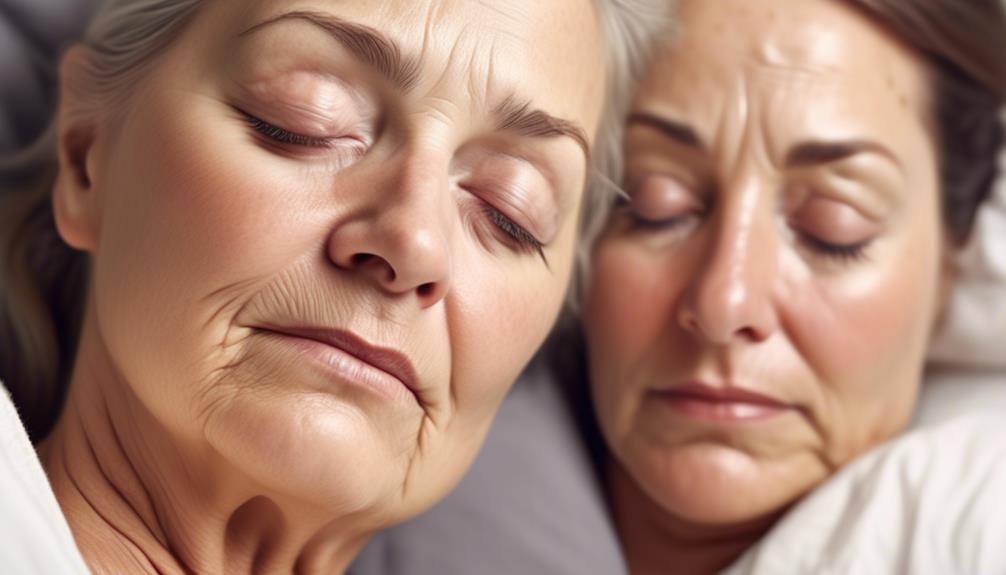As caregivers, we often navigate a delicate balance, striving to meet the duties associated with our roles while managing the exhaustion caused by lack of sleep.
Imagine a simple act that can reset our internal clock and rejuvenate our weary bodies in just 30 minutes. This intriguing solution offers a ray of hope for those struggling with the relentless effects of caring for others while neglecting their own well-being.
By uncovering the potential of a short nap to reverse the negative impacts of sleep deprivation, this study opens doors to a new realm of self-care practices that could revolutionize how caregivers maintain their health and vitality.
Key Takeaways
- Short naps counteract sleep deprivation's impact.
- Napping boosts immunity and reduces stress.
- Caregivers benefit from improved cognitive function after naps.
- Prioritizing rest enhances caregivers' overall well-being.
Impact of Sleep Deprivation on Caregivers
The impact of sleep deprivation on caregivers encompasses a wide range of detrimental effects on their mental and physical well-being. Quality of life for family caregivers is significantly influenced by the amount and quality of sleep they receive. Sleep deprivation not only affects their sense of humor and alertness but also puts them at a higher risk of depression due to the strong correlation between lack of sleep and mental health issues.
Caregivers providing nighttime care face particular challenges as their sleep patterns are often disrupted, leading to increased fatigue and decreased cognitive function. Adequate sleep is crucial for caregivers to maintain their overall health and well-being while effectively caring for others. However, the effects of sleep deprivation can be reversed to some extent by incorporating a 30-minute nap into their daily routine, offering a potential solution to mitigate the negative consequences of sleep loss on caregivers' mental and physical health.
Study Reveals Reversal in 30 Minutes

Preliminary findings from a recent study demonstrate that a 30-minute nap holds the potential to reverse the negative effects of sleep deprivation in caregivers swiftly and effectively. This short period of rest can significantly impact caregivers' well-being by reducing stress levels, enhancing the immune system, and normalizing hormone levels. Incorporating a simple 30-minute nap into the daily self-care routine could be the key to combating the detrimental effects of sleep deprivation on caregivers.
To highlight the benefits of a 30-minute nap for caregivers, let's take a closer look at how this short rest can positively impact them:
| Benefits of a 30-Minute Nap for Caregivers |
|---|
| Reduces stress levels |
| Improves the immune system |
| Normalizes hormone levels |
Napping for just half an hour not only boosts alertness but also contributes to overall well-being, making it a valuable addition to the self-care routine of caregivers.
Benefits of Short Rest for Caregivers
Napping for just half an hour significantly enhances alertness and cognitive function in caregivers, positively impacting their overall health and well-being. Studies have shown that a brief nap can lead to improvements in the endocrine and immune systems of caregivers. After a nap, hormone levels tend to normalize, reducing stress levels and enhancing overall well-being. This short period of rest is crucial for caregivers as it allows their bodies to recuperate and recharge, ultimately leading to better health outcomes. By incorporating naps into their daily routines, caregivers can counteract the negative effects of sleep deprivation and improve their overall quality of life.
Taking a nap shouldn't be viewed as a luxury but rather as a necessary component of self-care for caregivers. It's a simple yet effective way to boost alertness, regulate hormone levels, and promote overall well-being. Caregivers who prioritize short periods of rest are better equipped to handle the demands of their role and maintain their health in the long run.
Improving Well-being Through Rest

Improving overall well-being through adequate rest is essential for caregivers to maintain their health and manage the demands of their role effectively. Quality sleep plays a crucial role in caregiving as it directly impacts mental and physical health. A study on Sleep Deprivation in Caregivers revealed that insufficient rest not only impairs cognitive function but also puts caregivers at an increased risk of stroke. Caregivers, who often sacrifice their own sleep to care for others, must prioritize their well-being to provide optimal care. Deprivation of sleep for extended hours can have detrimental effects on family caregivers, affecting their ability to provide quality care and increasing their susceptibility to mental health issues.
Recognizing the importance of rest, caregivers should consider incorporating short naps into their daily routine. Research demonstrates that even a 30-minute nap can reverse the negative effects of sleep deprivation, boosting alertness, reducing stress levels, and normalizing hormone levels. By viewing napping as a beneficial practice rather than a luxury, caregivers can enhance their overall health and well-being, ultimately improving their capacity to care for others effectively.
Hope for Sleep-Deprived Caregivers
Prioritizing adequate rest is crucial for caregivers experiencing sleep deprivation, offering a beacon of hope for their well-being. Incorporating a 30-minute nap into their daily self-care program can significantly impact caregivers' health. Napping has been shown to boost immunity, decrease stress levels, and normalize hormone levels, all of which are vital for improving overall well-being. This simple practice can reverse the negative effects of sleep disturbances that often plague caregivers due to their demanding roles.
To emphasize the benefits of napping for caregivers, consider the following table:
| Benefits of Napping for Caregivers | |
|---|---|
| Boosts Immunity | Decreases Stress Levels |
| Normalizes Hormone Levels | Improves Overall Well-being |
Millions of caregivers can benefit from recognizing the value of taking a short nap during the day or night. By viewing napping as an essential component of self-care rather than a guilty pleasure, caregivers can proactively support their health and well-being.
Frequently Asked Questions
How Long Does It Take to Reverse Sleep Deprivation?
We can reverse sleep deprivation effects within 30 minutes. By taking a brief nap, hormone levels normalize and cognitive function improves.
This quick rest boosts alertness, decreases stress, and enhances overall well-being. The body's immune function significantly benefits from a 30-minute nap, countering the impacts of sleep deprivation effectively.
Sleep-deprived caregivers can rely on this short break to restore their vitality and rejuvenate their mental clarity swiftly.
Can the Effects of Sleep Deprivation Be Reversed?
We've looked into whether the effects of sleep deprivation can be reversed. Research indicates that implementing a 30-minute nap into one's routine can help combat the negative impacts of sleep deprivation, such as improved hormone levels and overall well-being.
How Can I Recover From Lack of Sleep Fast?
When we need to recover from lack of sleep fast, a 30-minute nap can be a game-changer. Napping boosts alertness, immunity, and cognitive function, helping us bounce back quickly.
Research shows that a short nap can decrease stress levels and normalize hormone levels. By incorporating naps into our daily self-care routines, we can significantly improve our overall well-being and enhance performance as caregivers.
How Long Does It Take to Recover From an All Nighter?
After pulling an all-nighter, it typically takes a 30-minute nap to start reversing its effects. This short nap can help restore alertness, cognitive function, mood, hormone levels, and reduce stress. Research shows that this timeframe is effective in mitigating the negative impacts of sleep deprivation.
Conclusion
In just 30 minutes, a short nap can work wonders for sleep-deprived caregivers, reversing the negative effects of sleep deprivation. Like a refreshing oasis in a desert of exhaustion, this quick rest not only improves alertness but also boosts hormone levels and strengthens the immune system.
Incorporating napping into daily self-care routines can be a game-changer for caregivers, offering a much-needed lifeline in the battle against fatigue and burnout.









